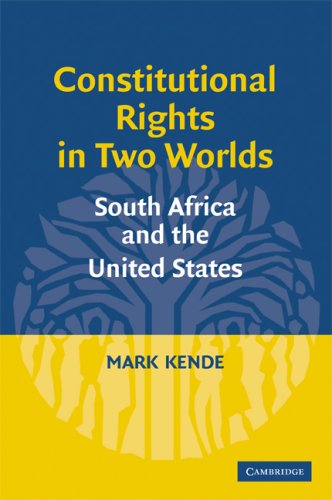Mark S. Kende0521879043, 9780521879040, 9780511517877
Table of contents :
Half-title……Page 3
Title……Page 5
Copyright……Page 6
Dedication……Page 7
Contents……Page 9
Preface and Acknowledgments……Page 11
1 Introduction……Page 17
The comparative angle……Page 20
Two constitutions……Page 22
The two courts……Page 24
Social change……Page 26
Contents of this book……Page 28
2 History and Background……Page 32
South Africa through Apartheid……Page 33
Transition……Page 45
United states……Page 53
The judicial branches……Page 61
Provisions……Page 64
Cases……Page 66
3 The Death Penalty……Page 68
History……Page 71
The Constitutional Court’s Analysis……Page 74
Values and Socio-Historical Context……Page 76
Reliance on International and Comparative Law……Page 78
The Right to Dignity……Page 80
The Right to Life: Hungarian Case Law……Page 81
Rejecting Public Opinion……Page 82
Minimalism and Pragmatism……Page 83
The Limitations Issue……Page 85
Deterrence……Page 87
Retribution……Page 88
Death penalty jurisprudence in the united states……Page 89
Furman v. Georgia……Page 91
Gregg v. Georgia……Page 93
McCleskey v. Kemp: Race Discrimination……Page 94
Summary……Page 95
The Exoneration Movement……Page 96
Comparative Sources……Page 101
Conclusion……Page 105
4 Gender Equality……Page 107
Mandela’s pardon……Page 108
The Majority Opinions……Page 109
Justiciability……Page 110
The Equality Issue……Page 111
Kriegler’s Dissent……Page 116
The American Approach……Page 117
Owen Fiss’s Group-Based Approach……Page 122
Catherine MacKinnon’s Dominance Approach……Page 124
Judicial Pragmatism……Page 125
Analyzing the Approaches……Page 126
Critiques……Page 132
The jordan decision……Page 133
The Majority Opinion……Page 134
The Dissenting Opinion……Page 135
Analysis……Page 136
Dissenting Opinion……Page 142
Analysis……Page 144
Conclusion……Page 147
5 Gay Rights……Page 149
South african gay rights jurisprudence……Page 151
The Sodomy Case……Page 152
The Immigrant Same-Sex Partner Case……Page 154
Judges and Their Same Sex-Partners……Page 155
Adoption by Gay Couples……Page 157
Gay Marriage……Page 158
The Civil Union Act……Page 162
Why Has the Court Been So Assertive?……Page 164
Criticisms of the Court’s Approach……Page 166
U.S. Supreme Court Cases……Page 169
New York……Page 171
Massachusetts and California: Rulings for Same-Sex Marriage……Page 172
New Jersey……Page 174
Analysis……Page 175
Conclusion……Page 177
6 Affirmative Action……Page 178
The Walker Decision……Page 179
The Van Heerden Decision……Page 182
The Motala Decision……Page 185
Statutory Provisions……Page 186
Further Thoughts……Page 188
Supreme Court Affirmative Action Rulings……Page 190
Symmetry……Page 194
Inconsistency……Page 195
The First Amendment……Page 196
Conclusion……Page 197
7 Freedom of Expression……Page 199
Supreme court categories of speech……Page 200
The RAV Decision……Page 203
Indecent Adult Establishments……Page 205
Other Problems……Page 206
South african free speech cases……Page 208
The Case Decision……Page 209
The Islamic Unity Decision……Page 214
The Khumalo Decision……Page 216
The South African Broadcasting Decision……Page 217
Comparing the approaches in context……Page 218
Danish Cartoons: The South African Perspective……Page 219
Danish Cartoons: The American Perspective……Page 221
Other South African Developments……Page 223
Broadcast Media……Page 224
Laws Relating to Free Speech……Page 226
Political Pressures on Free Speech……Page 227
Conclusion……Page 229
8 Freedom of Religion……Page 230
Colonial oppression and religion in south africa……Page 233
The formalistic cases……Page 238
The Sunday “Prohibition” Case……Page 239
Spanking in the Schools……Page 243
Smoking Weed and the Court……Page 245
Chief Justice Chaskalson’s Majority Opinion……Page 246
Justice Ngcobo’s Dissent……Page 247
Justice Sachs’s Dissent……Page 248
Analysis of the Prince Decision……Page 249
Nose Studs and the Court……Page 252
Why the formalism?……Page 254
Conclusion……Page 257
9 Socioeconomic Rights……Page 259
South africa’s socioeconomic rights jurisprudence……Page 260
The Right to Housing……Page 261
The Right to Health Care……Page 265
Soobramoney v. Minister of Health……Page 266
Minister of Health v. Treatment Action Campaign……Page 267
Social Security……Page 270
The Port Elizabeth Decision……Page 272
The Modderklip Decision……Page 274
Summary……Page 276
The Minimum Core……Page 277
More Content……Page 281
Resources……Page 284
Stricter Scrutiny……Page 285
Remedies……Page 286
The Hippocratic Oath Argument……Page 287
The Argument from Democracy……Page 288
Institutional Legitimacy……Page 290
U.S. Supreme Court Cases……Page 291
Separation of Powers……Page 293
The Legislature’s Prerogative……Page 294
Competence……Page 295
Negative Rights……Page 296
The Reaction……Page 298
South african jurisprudence……Page 302
The Juristocracy Objection……Page 304
Against the Two Stages……Page 310
Undervaluing Rights……Page 311
Vagueness Problems……Page 313
The Future……Page 314
Supreme court jurisprudence……Page 316
Index……Page 323

Reviews
There are no reviews yet.